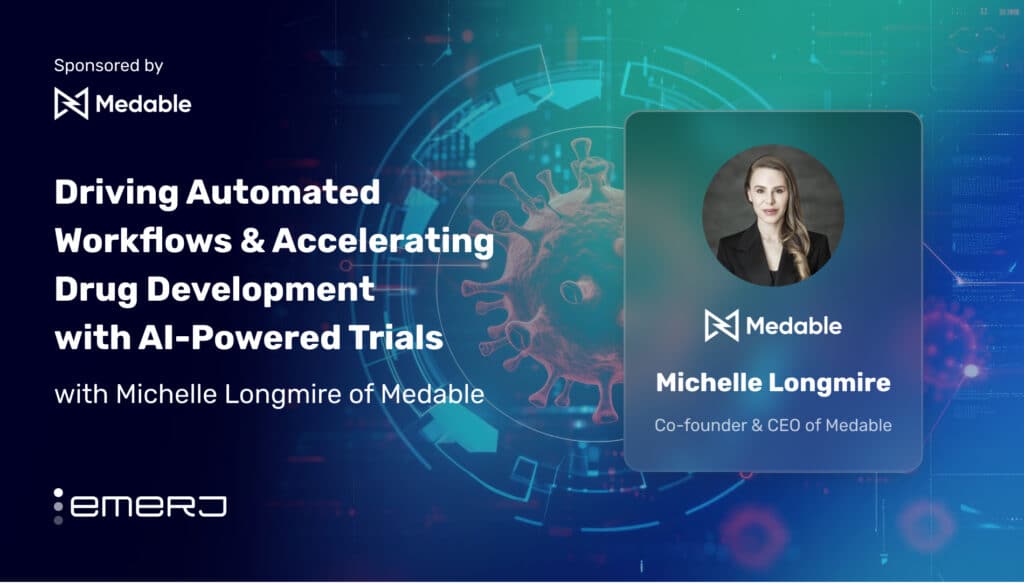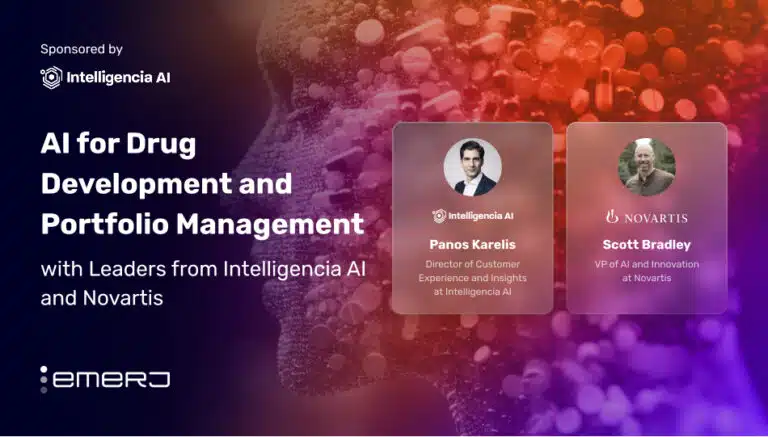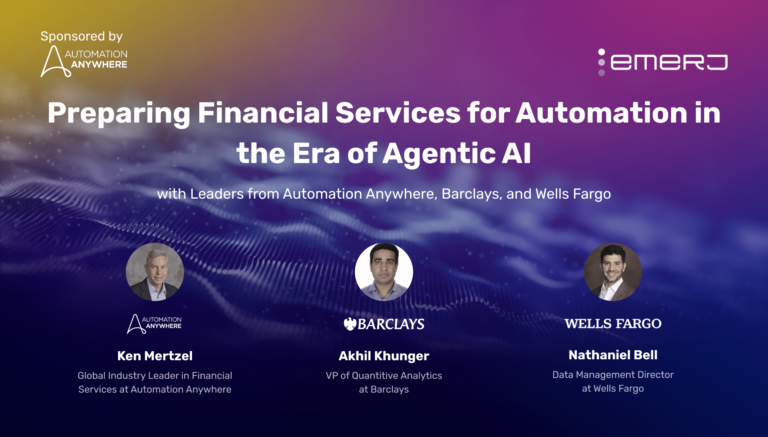This interview analysis is sponsored by Medable and was written, edited, and published in alignment with our Emerj sponsored content guidelines. Learn more about our thought leadership and content creation services on our Emerj Media Services page.
Although there is seemingly a constant stream of impressive headlines touting new drug treatments or potential cancer cures, medical breakthroughs occur at a slow pace. It can take upwards of 10 years from the time a medical breakthrough is discovered until it is eventually available in the market.
Clinical trials are necessary to test the safety and effectiveness of new treatments. When clinical trials fail before they even start, medical breakthroughs are obviously delayed. Fortunately, the emergence of AI has the potential to change that situation.
A study published in Health Services Research and Quality of Care identified several barriers to clinical trial participation such as access to insurance, travel cost, and even availability of child care. Another study in the Journal of Clinical Oncology showed that more patients are willing to participate in clinical trials than are actually accrued, and the number of willing patients is further reduced by some physicians who are reluctant to engage in accrual.
AI has the potential to drastically improve this situation not only by improving the patient recruitment process but also by better matching patients with trials. The potential goes far beyond that, though.
Emerj Senior Editor Matthew DeMello recently sat down with Co-Founder and CEO of Medable, Michelle Longmire on the ‘AI in Business’ podcast to talk about AI is already beginning to transform clinical trials and the future possibilities for improvement that non-deterministic AI can offer.
The following article will focus on three key takeaways from their conversation:
- Redefining the clinical trial experience for patients, sites, and sponsors: Using Agentic AI to optimize the clinical trial process by monitoring data in real-time to 10x the number of drugs approved a year.
- Compressing the 4-year timeline to complete a Phase 3 clinical trial: Using deterministic AI to address core scientific questions including whether drugs are safe or effective and which patients are most likely to benefit from treatment earlier in clinical trials.
- Leveraging AI to improve quality and compliance in clinical trials: Using automation to run through unlimited edge cases to improve quality of clinical trials.
Listen to the full episode below:
Guest: Michelle Longmire, Co-Founder and CEO, Medable, Inc.
Expertise: Improving human health through advancements in human research, improving evidence generation in clinical trials to accelerate drug development
Recognition: Prior to founding Medable in 2015, Longmire was an attending physician in Adult Dermatology and a postdoctoral research fellow at Stanford University School of Medicine.
Redefining the Clinical Trial Experience
At the beginning of the podcast, Longmire starts by explaining the broader problem that pharmaceutical companies face when conducting clinical trials. She mentions that there are over 10,000 human diseases that are either untreated or suboptimally treated.
However, it takes over 12 years and $2.6 billion to develop a new drug, according to Longmire. She succinctly describes the impact of this, “If you take the current timeline and then the biggest problem of human suffering and disease, we’re on a 200-year path, at best, to cure human illness.”
Longmire then explains how drug development is largely manually driven once it’s in the in-human testing phase. She further acknowledges that the process is slow and that, for a large part of that process, not much occurs to optimize the scientific problem and challenge. It’s possible to optimize the clinical trial process through data analytics and AI because they enable a much closer view of what is working and what isn’t working.
Optimizing the clinical trial process is not unlike how manufacturing or logistics companies would optimize, according to Longmire. It requires having a clear understanding of the current status in real-time and identifying opportunities for optimization.
“What we want to do at Medable is essentially bring technology leverage.” Through the use of data analytics and AI, Medable wants to 10x the number of drugs approved a year, all without jeopardizing safety or efficacy requirements.
While Longmire recognizes that this is a very ambitious goal, she expands further on how Medable aims to achieve this. Medable enhances the decision-making process by leveraging AI throughout the clinical trial process. AI allows pharmaceutical companies to detect safety and efficacy concerns much earlier than traditional approaches allow. Medables customers can adjust protocols or even discontinue trials quickly if they’re deemed ineffective.
Longmire goes on to explain how there are many low-effort opportunities for deterministic automation, which uses clear, well-defined statistical rules. Currently, it’s important to focus on deterministic opportunities when trying to reduce whitespace, according to Longmire, because the clinical trial industry has not yet figured out how to handle non-deterministic AI outputs.
It is precisely this gap that presents a unique opportunity for AgenticAI, more so than in other regulated industries such as finance or e-commerce. Clinical trials are heavily regulated because they deal with life and death issues pertaining to human life.
As a result, clinical trials require precision and consistency in the underlying processes. They also need to be aligned with strict guidelines for patient safety and data integrity. Non-deterministic AI is based on probabilities, not clear rules, so it introduces uncertainty that the pharmaceutical industry has not figured out how to handle yet.
She explains that using automation can enable decisions to be made in minutes that would otherwise take weeks without automation.
Compressing the 4-year Timeline to Complete a Phrase 3 Clinical Trial
Longmire describes how the clinical development process begins with a scientific protocol designed to tell whether the drug is effective and safe. Clinical trials are needed to answer those questions. She then elaborates on the core scientific questions that a clinical trial answers both before and after patients are enrolled. Prior to enrolling patients, questions for those conducting clinical trials center on:
- Where should we–pharma companies establish clinics?
- Where are the patients located?
- How can they actually enroll patients?
- What clinics see the most of this type of patient?
- What geographic areas are patients going to be incentivized to be in a clinical trial?
After patients are enrolled:
- Is the drug effective?
- Is the drug safe?
- How many people are needed to see this drug used in what specified period of time to even begin to develop safety and efficacy signals?
Longmire explains that analyzing in real-time and creating an agile process is very beneficial, “Today, as it stands, we’re largely only looking at that at one middle point in time:the interim analysis.”
She then emphasizes AI lets companies evaluate core scientific questions earlier than the typical point at which they’ve been answered: during interim analysis.
Medable’s clients can get a view far earlier in the process to determine if fewer patients than initially anticipated can be enrolled in the study. Providing earlier views could also lead to savings to the tune of billions of dollars if a lack of signal occurs, and it becomes apparent that the study will be a failed effort. It can even result in rethinking the disease area, according to Longmire.
Leveraging AI to Improve Quality and Compliance in Clinical Trials
Even though generative AI (GenAI) is currently underdeveloped in the clinical trial industry, there are future opportunities for its use related to synthetic data and synthetic patient profiles.
Longmire explains the possibility of GenAI being used for synthetic data creation to yield unique patient profiles that are still within statistical boundaries. Synthetic data generation can significantly reduce the number of patients needed to enroll in a study for both placebo or intervention groups. However, she clarified this as a future goal dependent on the development of a proper regulatory framework.
Longmire then articulates what impact the timeline of how long it takes to get a drug to market has on the ROI of the medicine. Medable’s customers have a competitive advantage by deploying technology earlier. She underscores that a main point of failure for clinical trials is that they simply fail to enroll enough patients, which affects 60% of clinical trials, according to Longmire.
When asked about how Medable is thinking about the measurable impact that AI is having on reducing time to enrolling the first patient and overall study startup timelines, Longmire explains how months and weeks really matter for Medable’s customers particularly if it means they’re the first pharma company into a clinic to enroll patients.
Medable’s customers are at a competitive advantage if they can quickly deploy technology and get it into the hands of doctors months earlier. SIn the process, she notes that the overall ROI of a medication is impacted directly by the timeline it takes to get it into the market.


















